Best air purifiers 2022: Do air purifiers work? Can they remove viruses, and which are the best in the UK?
This article contains affiliate links. We may earn a small commission on items purchased through this article, but that does not affect our editorial judgement.
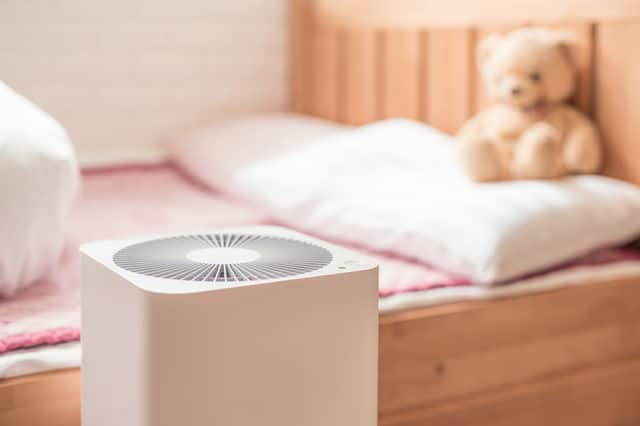

A certain pesky little microbe may be one of the main reasons why air purifiers are enjoying such sterling sales right now.
Whether that’s sole reason to splash out on a model is up to the individual, but air purifiers really do excel at removing dust particles, smoke, pet dander, pollen, bacteria, mould, skin cells and other microscopic particles from the home environment. The models here do it automatically with zero intervention.
How do air purifiers work
Air purifiers suck the air from a room through a perforated outer shell before shoving it though a series of air filters. In most cases, the filter combination comprises three individual units.
The first filter is usually an outer nylon mesh which catches pet hair and large particles of dust. This filter should be cleaned on a regular basis using a handheld vacuum cleaner if possible.
The second level of defence is a carbon filter which usually consists of thousands of tiny black beads contained in a collection of separate honeycomb-shaped pods. This filter keeps the air smelling fresh and will need replacing after several months.
The final and most important filter is the HEPA (High-Efficiency Particulate absorbing Filter). This filter is made from a specialised plastic or fibreglass. The HEPA is the last line of defence – it’s the one that deals with the smallest particulates – and this filter will also need to be changed after about six months use. Most decent models will also tell you when to change the filter.
Are air purifiers effective against COVID-19?
COVID-19 is at the lower end of a HEPA filter’s range, so won’t be 100% effective on a single pass. But if you run a HEPA system over a period of time, it can remove most viruses — 99.94 to 99.97%. Long enough exposure to the UV light in an air purifying device can disable some viruses, including COVID-19.
Automatic sensors
The best models are equipped with particle sensors and some include wi-fi connectivity for simple app control, air quality notifications and general stats. The great thing about sensor-equipped models is that they automatically react to the air around them.
Hence, if there are cooking fumes or smoke in the vicinity, the air intake fan will automatically ramp up to full speed until the sensor registers normality again, at which point the fan will reduce to a near-silent cruise.
What does PM and AQI mean?
PM stands for Particulate Matter and it’s a number you often see on the display of air purifying units. Some models also display an Air Quality Index (AQI) that covers a range of different pollutants.
Most HEPA-equipped air purifiers will capture over 99% of impurities in the air and when they’re detected, most air purifiers will let you know, sometimes with a number but usually with a graded colour scheme on the display that ranges from green (good) to red (bad).
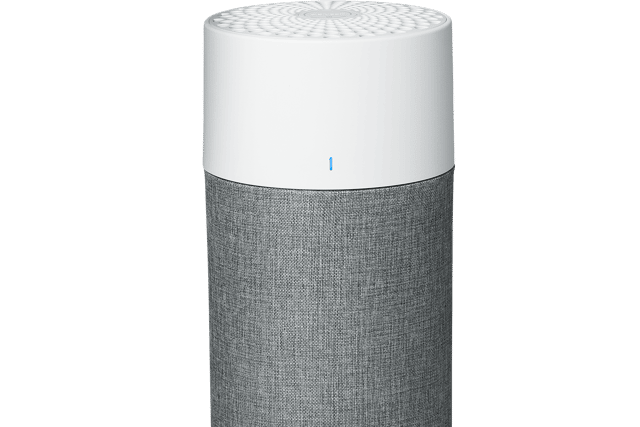

Best for: Smaller rooms
Blueair is arguably the class leader in home air purification – it started producing models way before most of the competition, Philips perhaps notwithstanding. Comprised of an outer fabric filter, a carbon filter and a standard particulate filter for the tiniest of particles like pollen and dust, this model is said to clear a 17m² room every 12 minutes.
The Blueair 3210 is certainly one of the most elegantly designed models in this roundup which means it won’t look out of place in any type of decor. In fact, you can even choose the fabric pre-filter cover from a selection of five subtle tones to suit your furnishings.
Crucially, this model is equipped with a particulate sensor so it will automatically detect poor air quality and react accordingly. It also has three manual air speeds.
Like the vast majority of air purifiers, the Blueair won’t cool you down because its fan points in an upwards direction. Nevertheless for efficient air cleaning on a smaller scale, it ticks all the right boxes.
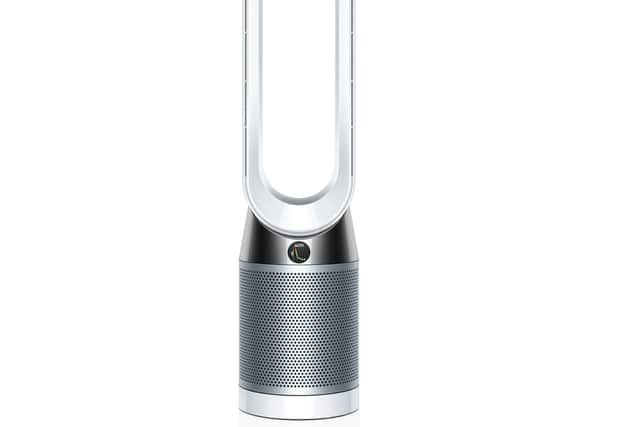

Best for: Keeping cool
This metre tall Dyson is the most expensive model here but then it is superbly built, classy looking and chock full with some of the best air purifying tech currently available.
This model is also a cooling fan because its air expulsion vents are forward facing rather than upward facing like the vast majority of models. This means it’s a perfect choice for keeping cool in the summer months. However, a simple tap of a button on the magnetic remote control switches it to diffuse mode, whereupon the air is gently diverted towards the rear via a pair of exterior side vents.
The Purifier Cool’s bank of sensors automatically measure a wide range of air impurities, turning the fan up and down whenever the need arises.
It has a Manual mode, too, which provides 10 fan speeds – handy for hot days. Even handier, this model has a superb oscillation function that can be adjusted in increments from 45˚ to a frankly amazing 350˚ – a wider reach than almost any other fan on the market.
The Purifier Cool has a colourful circular LED display on the front which highlights everything you need to know about the quality of air in the room. It also works in conjunction with the slick Dyson Link app which displays a whole bunch of useful data, including overall air quality (AQ), plus sub categories like Particular Matter (PM), VOC (Volatile Organic Compound) and nitrogen dioxide from cooking and vehicles. Very informative, in other words.
Granted, this elegant large-room model is anything but cheap but it is one of the most efficient and feature-filled air purifiers on the market, while being a damn good cooling fan in the process. It’s also much quieter at full bore than the earlier model and it doesn’t use too much electricity in the process.
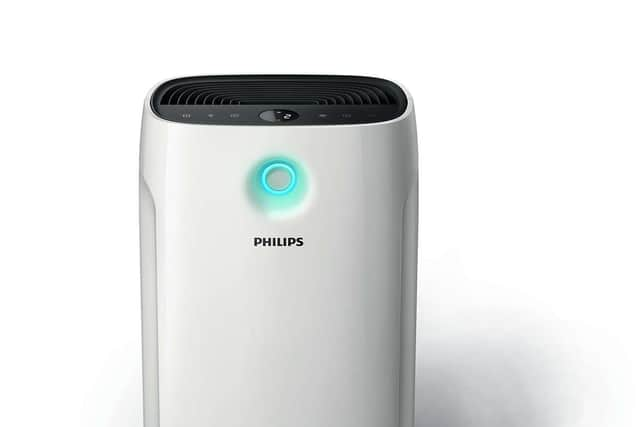

Best for: Medium to large rooms
The Philips 2000i is perfect for medium to large rooms up to 79 m² and comes with three main Auto programs: Allergen mode, General mode and Bacteria & Virus mode, which boosts the airflow to ‘quickly reduce bacteria & viruses’. When it’s time to tuck up in bed, select the Sleep mode and you won’t hear a whisper from it.
The Philips’ sensors constantly measure the level of particulates around the appliance at any given time and the relevant number is displayed on the top panel as a PM2.5 reading (PM2.5 refers to microscopic atmospheric particulate matter that have a diameter less than 2.5 micrometres, about 3% the diameter of a human hair).
Further air quality feedback is provided via an easily visible multi-coloured glow lamp on the front: blue is good, blue-violet is fair, red-purple is unhealthy and red means danger. To test it, I blew some smoke in its direction and the PM2.5 number increased substantially while the light turned violet.
As is the case with all air purifiers, this model’s filters will need to be changed every six months or so depending on its usage – at a cost of £90 for both the carbon and HEPA filters.
Nevertheless, given its overall efficiency, decent looks and impressive feedback, the Philips is fully deserving of your attention.
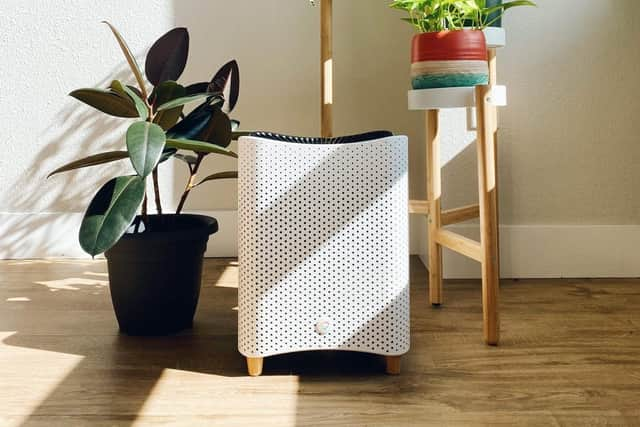

Best for: Usability and fun
This is a brand new model that’s ready for pre orders in the UK for delivery in June.
The Mila has already garnered a wealth of positive reviews and deservedly so because it genuinely pushes the design envelope with a thoughtfully and amusingly styled app that bombards the user with real-time info galore on pretty much every bad air thing in the house, including deadly CO.
Mila’s tech bods have clearly analysed the social networking arena because the interface is full of light-hearted lingo and smiley faces that encourage you to dig deeper into the app and further analyse the air purity of your abode. It’s something that goes well beyond what other air purifiers provide, Dyson notwithstanding.
The Mila is available with a choice of seven different HEPA filters for different scenarios and they’re all huge. For instance, the Basic Breather filters 99.6% of bad air but it doesn’t have a carbon filter while The Overreactor with its Modified Granular Carbon filter is said to filter 99.995%.
There are even filters designed for mums-to-be and pet owners.
The Mila has quite a large footprint (it measures 30cm x 30cm and stands 40cm tall) so it’s better suited to larger rooms. It’s attractively designed, too, and sits on four bamboo legs that give it an extra touch of style.
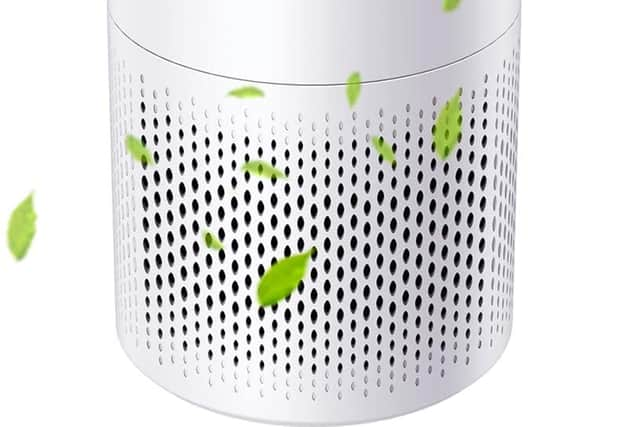

Best for: Value
If you’re on a tight budget then Elechomes is good starting place. This small model is suitable for rooms up to 25m² and comes with a four-stage filtration system comprising a pre-filter for removing pet hair and fibres, a cloth filter for larger particles, an activated carbon filter for getting rid of cooking odours and smoke and an H13 True HEPA Filter that is said to remove ’99.97% of airborne particles as small as 0.3 microns’.
The Elechomes smart particle sensor, meanwhile, monitors the environment on a constant basis, starting up the fan when required while displaying a green, amber and red glow across the top of the unit to let you know how bad or good things are. It also has a manual mode with three fan speed settings.
This model’s rated power is just 28W so you can leave it on all day without adding too much to the annual leccy bill. And when it’s time to visit the land of nod, simply put it into sleep mode and it’ll tick over all night with only a tiny glow from the indicator lamp.
This small-room air purifier offers a lot of tech for the ultra low price. It’s easy to use, effective at removing most air impurities and it looks aesthetically pleasing, too.
We’d would advise buying an extra air filter at the same time (£19.99) in case they’re harder to find further down the line.
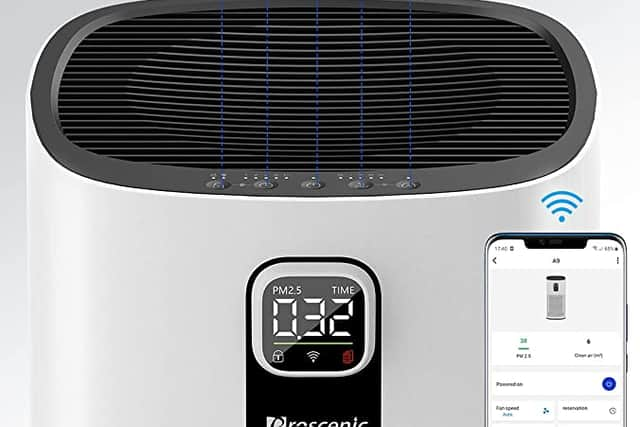

This large air purifier is ideal if you want to target larger rooms like living room or open spaces.
We handed this air purifier to a tester with dust allergies to see if it could target their issues, and they reported a marked difference in their allergies acting up, stating it did a grand job of clearing dust particles from the air.
It’s generally a very quiet machine but will roar like mad if there’s cooking steam or smoke in the air, only quieting when the air is clear - this is quietly satisfying if you want to feel the machine working.
If you have an Alexa, this pairs with it beautifully, making it a natural choice for those owners.